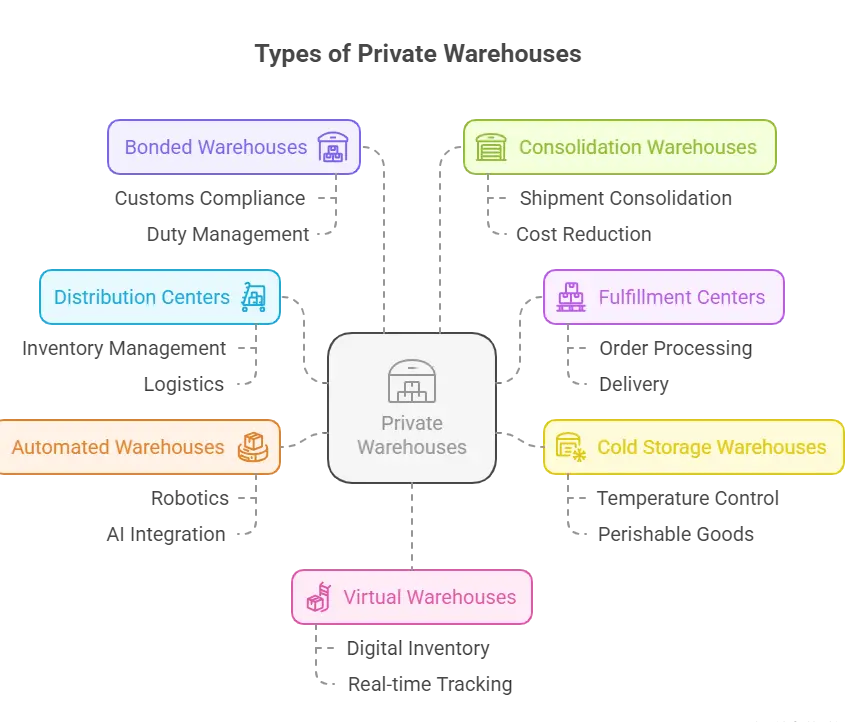The commodity demand varies greatly in these competitive times because of supply chain constraints, irregular consumer behavior, or overall economic conditions. The most effective solution to this frequent issue is warehousing, an essential component of supply chain management. Private warehouse are a standout option among other warehousing options for firms with specialized demands and adequate resources.
This blog will examine the definition of a private warehouse, its varieties, advantages, and other aspects, offering a thorough grasp of this crucial component of logistics.
Ready to explore further? Plunge in!
What is a Private Warehouse?
When a company owns and operates a warehouse exclusively for its personal use, having complete control over its storage and distribution processes is known as a private warehouse. It is mostly owned and managed by manufacturers, distributors, and wholesalers.
For large companies with greater profits, a private warehouse is always a better choice as it aims to reduce their constantly growing shipping and transport costs. Smaller enterprises and companies cannot financially afford private warehouses as they require a lot of investment in construction, management, and maintenance.
In contrast to public warehouses that cater to several customers and are rented out, private warehouses provide specialized solutions that are made to fit the demands of the owner company.
Let’s take the example of one of the largest e-commerce company such as Amazon, which has a network of warehouse facilities worldwide. The company manages its entire inventory, and supply chain and ensures fast delivery of its products to final customers. With advanced technologies and customized layouts to strictly meet their needs, Amazon’s private warehouses come in designated complexes that deliver the best service for the company.
Types of Private Warehouses

The specific forms of private warehouses can be simply grouped into some categories that meet different business requirements. Here are some common types:
1. Distribution Centers
Distribution centers are strategically located and in nature function as warehouses to keep the goods to sell them to retailers, wholesalers, or even directly to the consumers on hand. The main purpose of this type of rapid transport is fast delivery of goods, limited delays for transportation as well as minimization of transit times.
2. Fulfillment Centers
Fulfillment Centers are used by e-commerce companies for storing products. They are responsible for all the processes of inventory storage, order processing, packing, and delivering ensuring well-managed order fulfillment.
3. Cold Storage Warehouses
These types of warehouses contain refrigeration units facilitating the storage of perishable goods including food, pharmaceuticals, and chemicals are usually a feature of these fulfillment centers. This helps maintain appropriate temperature which is used to maintain the quality and safety of these commodities.
4. Automated Warehouses
Automation in warehouses has high-tech features such as robotics, AS/RS, and WMS to boost efficiency and operability. They are ideal for enterprises that need high volumes of storage and retrievals.
5. Bonded Warehouses
A bonded warehouse is a storage of imported goods that lasts until the payment of any customs duty is done. These facilities offer secure, regulated storage for dutiable commodities, enhancing businesses’ cash flow management.
6. Consolidation Warehouses
Consolidation warehouses play a practical role in making shipping more efficient and affordable. Instead of sending out multiple small shipments from different suppliers, these warehouses bring everything together and combine them into one larger delivery. This not only cuts down on transport costs but also saves time and reduces the hassle of managing many separate deliveries. It’s a smart solution for businesses that ship smaller orders often but still want to keep logistics smooth and cost-effective.
7. Virtual Warehouses
Modern businesses are increasingly using virtual warehouse models, which rely on digital platforms to track and manage inventory spread across multiple physical locations. Instead of storing all products in one place, companies can monitor stock levels in real-time across different warehouses, stores, or even supplier sites. This approach improves flexibility, speeds up order fulfillment, and helps reduce excess inventory and storage costs by making smarter use of existing resources.
Benefits of warehousing
1. Space Optimization and Layout Planning
- Designing for maximum vertical and horizontal space utilization ensures efficient movement of inventory and staff.
- The selection and configuration of appropriate warehouse racking systems help increase density and accessibility for stored goods.
2. Workflow and Accessibility
- Layout plans should support smooth material flow, minimize bottlenecks, and allow for safe operation of machinery (e.g., forklifts).
- Placement of aisles, loading docks, and picking zones must be intuitive and support the fastest possible order fulfillment.
3. Environmental Controls
- Ventilation and humidity control are essential, especially for goods sensitive to moisture, temperature, or air quality.
4. Safety and Compliance
- The design must account for fire suppression, emergency exits, clear signage, proper lighting, and weight limits for racking to ensure safety and regulatory adherence.
5. Inventory Management and Slotting
- Integrating advanced inventory management systems (IMS) supports precise stock tracking, accurate inventory audits, and automated replenishment.
- Strategic slotting places high-demand or fast-moving items closer to shipping zones, boosting picking efficiency.
6. Technology and Automation
- The use of warehouse management software, robotics, conveyers, and automated picking systems enhances throughput and reduces manual labor.
- Smart technologies support predictive maintenance, real-time tracking, and efficiency analytics.
7. Scalability and Flexibility
- The design should allow for future growth, seasonal fluctuations, and changes in product mix.
- Modular racking systems or mezzanines make it easier to adapt as needs change.
8. Staff Welfare and Ergonomics
- Providing safe walkways, climate control, rest areas, and ergonomic workstations improves productivity and reduces injuries.
9. Security Measures
- Security cameras, controlled access points, and inventory tracking help prevent theft and shrinkage.
10. Sustainability
Incorporating energy-efficient lighting, recycled materials, and waste-reduction programs can help meet sustainability goals
Advantages of Private Warehouse
1. Control and Flexibility
Companies can have complete control of their warehousing and distribution processes when they are organized in a private spot. With the help of this one extra control, unique solutions are offered to customized operational needs, raising the efficiency level.
2. Improved Inventory Management
Companies can allocate dedicated areas and resources to set up inventory management systems which would facilitate a smooth running of the firm. This, in turn, helps in better data tracking, reduced flaws, and excellent stock management.
3. Enhanced Security
Private warehouses are used by one company for storage purposes; therefore, they have a lot of tight security measures in place when compared to public undertakings. When it comes to placing important items, this is vital as it enables one to avoid the chance of theft, and damages enabling the safekeeping of the inventory.
4. Branding Opportunities
Personal warehouses allow for the branding of the trademark by the respective companies and the creation of a unique corporate identity. Companies can create their organizations to communicate their corporate values and produce wider recognition for themselves.
5. Long-term Cost Savings
Although, buying or establishing of privately owned warehouse is costly at the beginning, in the long run, it helps in cost reduction. There is no need to undertake maintenance costs and the companies can adjust their operations according to the set goals.
Disadvantages of Private Warehouse
1. High Initial Investment
There is a need for huge upfront capital for opening private warehouses. This involves expenses on designated land, buildings, equipment, and technology installations.
2. Maintenance Costs
The recurrent expenditures and running expenses that dominate these projects can be very high. Allocate funds for utilities, labor, repairs, and renovations to maintain the warehouse in good condition.
3. Capacity Utilization
Shifts in demand may lead to underutilization of warehouse spaces. At times of low demand, if one operates a private warehouse, it may cost more money than it should.
4. Limited Flexibility
Contrary to public warehouses that offer short-term rental just for temporary periods, private ones need a long-term service agreement. This can become difficult for businesses with large storage requirements.
Conclusion
Having a private warehouse for your company can bring in a lot of benefits, such as control and flexibility, security, and even branding possibilities. On the other hand, such opportunities come with challenges like initial investments and recurring operational and maintenance costs.
Whether you are a large company that requires a complex storage facility or a smaller firm aspiring to follow a perfect supply chain, the choice of your warehousing solution may strongly affect the logistical aspects of your business. Hence, you should determine which kind of warehouse is a good fit for your company, based on your business needs and resources
FAQs: Private Warehouse
1. How will I choose between a public and a private warehouse?
When deciding between a public or a private warehouses consider some important factors related to your business like size, budget, operational needs, storage requirements, control, and security.
2. Can businesses switch from a public warehouse to a private warehouse?
Yes, this can be done based on one’s business growth and needs. This transition requires careful planning, considering factors like initial investment, operational changes, and the development of customized solutions to meet specific business requirements.
3. What are the long-term financial implications of choosing a private warehouse?
Though the initial investment for a private warehouse is high, it can lead to significant long-term cost savings, as businesses can save their rental fees and gain the flexibility to scale operations as needed. However, it’s also essential to maintain a budget for ongoing maintenance and operational costs.
4. What types of companies benefit most from private warehouses?
Large manufacturers, distributors, and retailers with high inventory turnover and specialized storage needs benefit most from private warehouses. These companies can justify the high initial investment due to the scale of their operations and the need for customized solutions. Private warehouses allow them to optimize logistics, improve service levels, and maintain tighter control over their supply chains.
5. How does a private warehouse support supply chain efficiency?
A private warehouse enables a company to design its storage, layout, and processes specifically for its product mix and distribution channels. This customization reduces handling times, minimizes errors, and streamlines order fulfillment. As a result, companies can respond faster to market changes and customer demands, boosting overall supply chain efficiency.
6. What security features are commonly implemented in private warehouses?
Private warehouses often use advanced security measures such as surveillance cameras, access control systems, alarm systems, and on-site security personnel. These features help protect valuable inventory from theft, damage, and unauthorized access. Enhanced security is particularly important for companies storing high-value or sensitive goods.
7. Are there technological advantages to operating a private warehouse?
Yes, companies can implement advanced technologies such as warehouse management systems (WMS), automation, robotics, and IoT devices tailored to their specific needs. These technologies improve inventory accuracy, speed up operations, and provide real-time data for better decision-making. In a private warehouse, the company can select and upgrade technology without restrictions from third-party providers.







